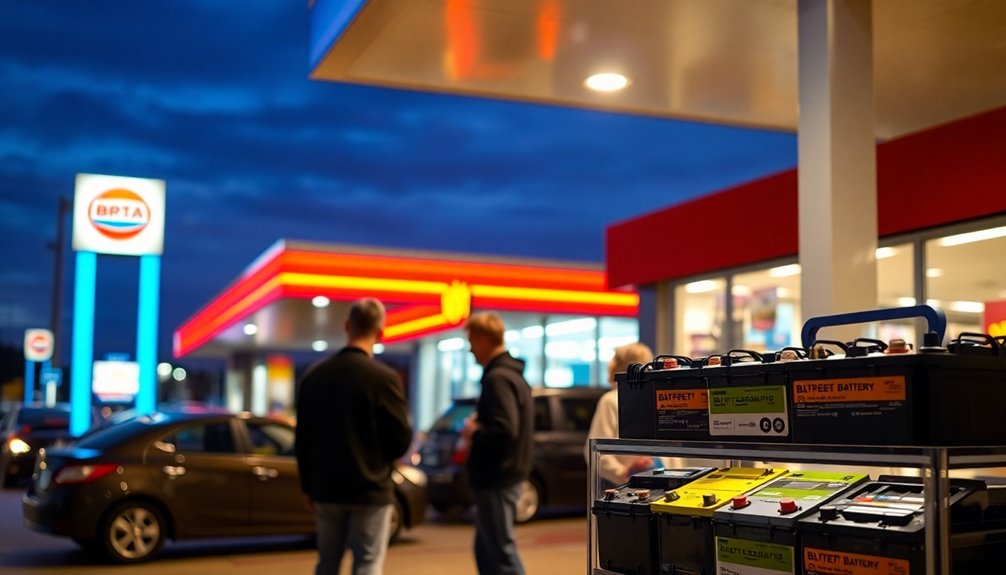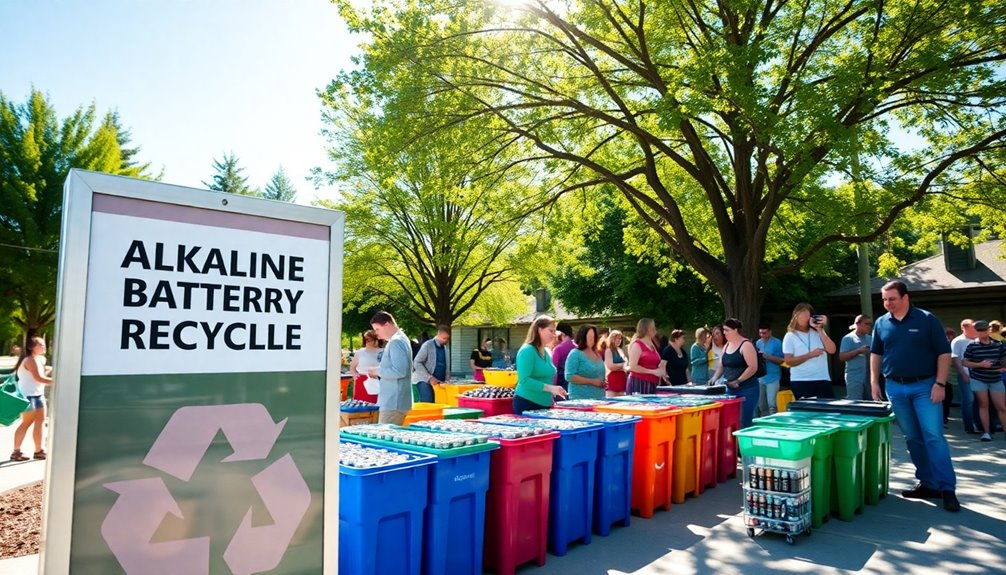Yes, gas stations do sell batteries, making them a convenient stop for your basic power needs. Chains like Circle K, 7-Eleven, and Shell typically stock common types like AA, AAA, C, and D batteries. Some locations may even offer automotive batteries for quick replacements. However, prices at gas stations tend to be higher than at supermarkets, so it's wise to compare options. While you're there, consider stocking up on various types for different devices. If you want to find out more about the best places and tips for battery purchases, keep exploring the options available!
Key Takeaways
- Most gas stations, such as Circle K, 7-Eleven, and Shell, typically stock common battery types like AA, AAA, C, and D cells.
- Specialty batteries, like button cells for watches, may be available but can vary by location and gas station.
- Automotive batteries may be offered at select gas stations for quick replacements, enhancing convenience for drivers.
- Prices at gas stations are often higher than at supermarkets, so comparison shopping is recommended for better deals.
- For a wider selection and competitive pricing, consider dedicated retailers or online stores for battery purchases.
Battery Availability at Gas Stations
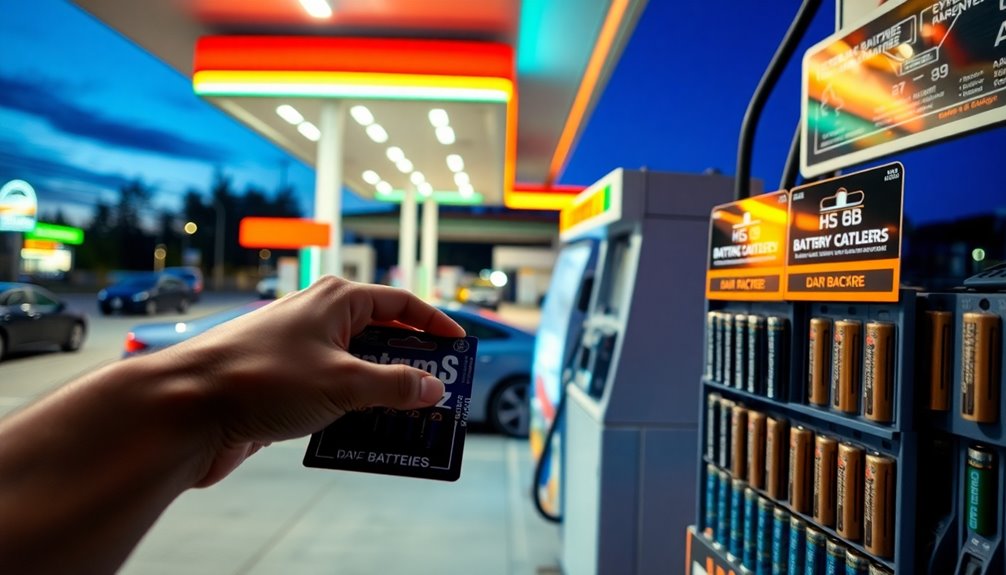
Have you ever found yourself in need of batteries while on the road? You're not alone! Many gas stations, including Circle K, often carry basic alkaline batteries like AA and AAA.
However, availability can vary by location, so it's smart to check ahead. If you need specialty batteries for electronics or automotive use, some stations might've them too, but not all do.
Don't hesitate to ask the store staff for help; sometimes, the battery section isn't clearly marked. Keep in mind that prices for batteries at Circle K can be higher than those at supermarkets, so compare options when you can.
In emergencies, gas stations can be lifesavers, but stocking up ahead of time is always a wise choice.
Popular Gas Station Chains
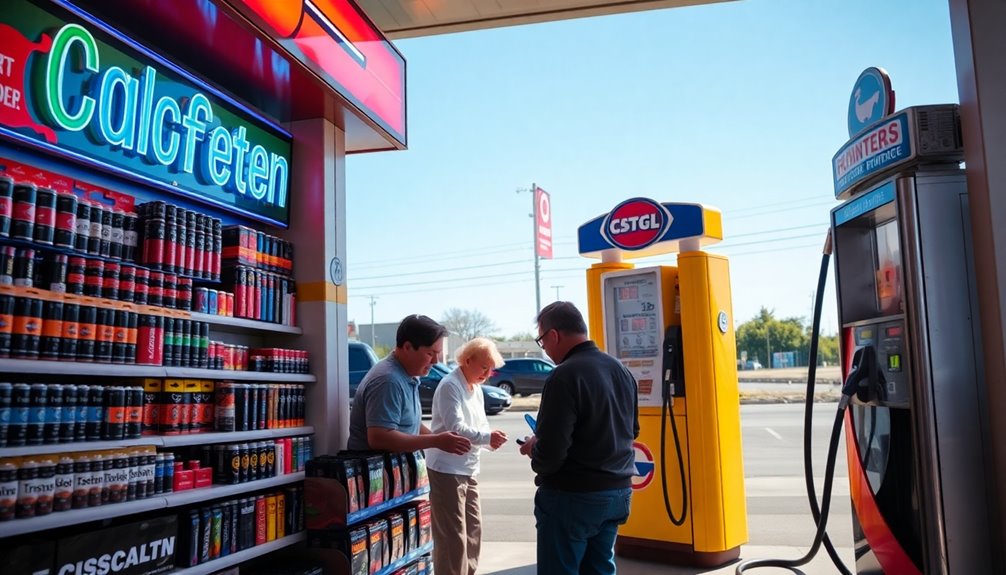
When you're on the road, knowing which gas station chains are popular can make your journey smoother. Chains like Circle K, 7-Eleven, and Shell are great stops for picking up batteries, as they typically stock basic alkaline options like AA and AAA.
However, keep in mind that battery availability can vary by location. Some stations may even stock specialty batteries, depending on local demand.
While prices at these gas stations tend to be higher than at supermarkets, it's wise to compare before making a purchase. Many gas stations don't have dedicated battery sections, so don't hesitate to ask staff for help.
Also, look out for seasonal promotions or loyalty programs for potential discounts on your battery purchases!
Types of Batteries Offered
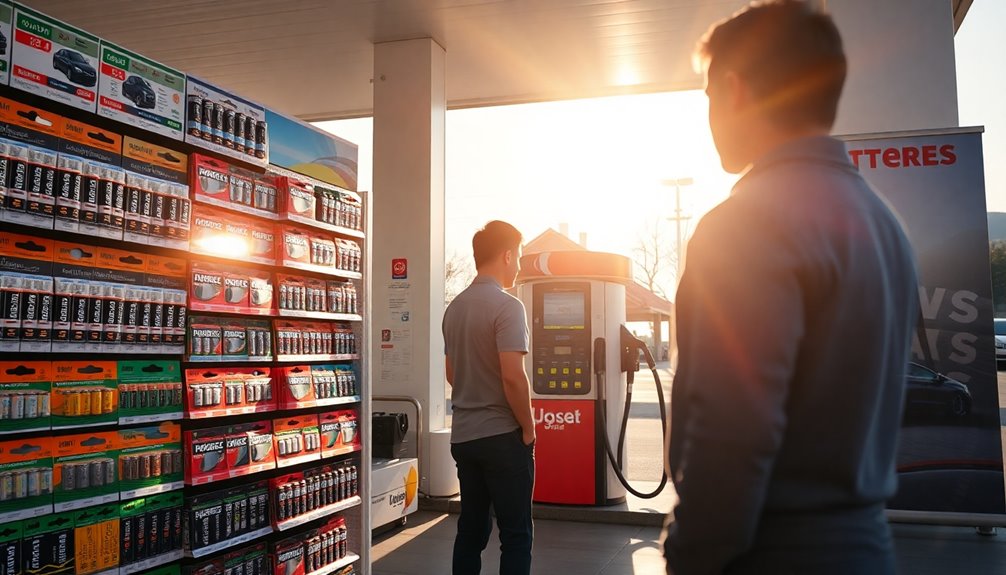
Stopping at a gas station can be a quick solution for picking up batteries, especially when you're on the go.
Most gas stations stock basic alkaline batteries, including popular sizes like AA, AAA, C, and D cells, perfect for everyday devices such as remote controls and flashlights.
Some locations might also carry button cell batteries for smaller electronics like watches and hearing aids.
If you find yourself in need of an automotive battery, select gas stations offer those too, making it easy for drivers to get a quick replacement.
While you can sometimes find specialty or rechargeable batteries, keep in mind that the selection may not be as extensive as what you'd find at dedicated retailers or supermarkets.
Emergency Preparedness Tips
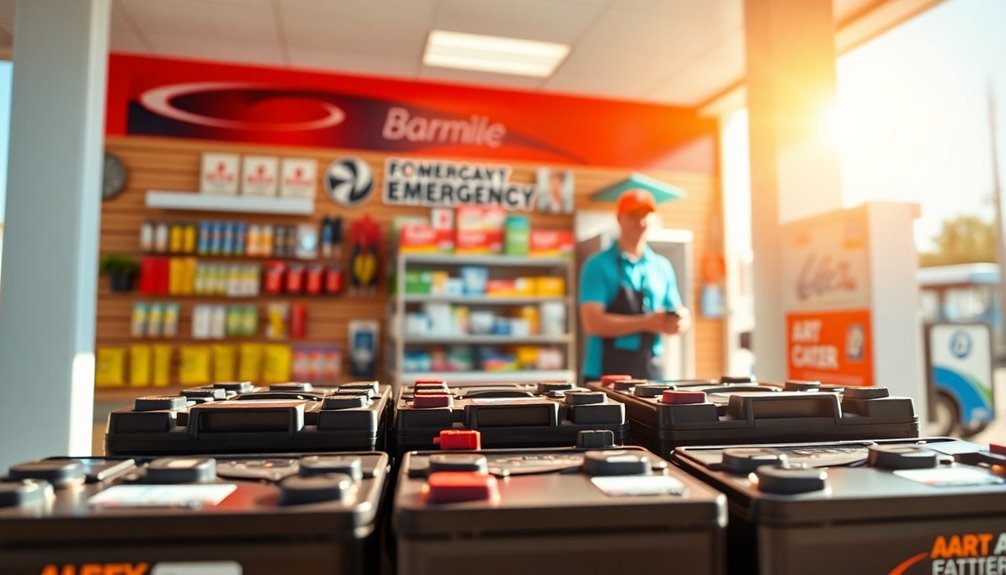
When it comes to emergency preparedness, stockpiling a variety of battery types is essential.
Having a diverse supply not only keeps your devices powered but also enhances your self-reliance during outages.
Plus, sharing resources with friends and family can strengthen your community's overall safety in a crisis.
Stockpile Various Battery Types
To guarantee you're prepared for emergencies, stockpiling a variety of battery types is essential. Make certain you have AA, AAA, and specialty batteries like CR123 for different devices.
In emergencies, batteries might be hard to find as local stores often sell out quickly due to high demand. Having rechargeable batteries on hand is a cost-effective and eco-friendly choice for long-term preparedness.
Regularly check and rotate your battery stock to verify they're functional and to avoid waste from expired batteries. Plus, consider sharing your surplus with friends and family to enhance community safety during power outages. Additionally, having a well-planned emergency fund can provide the financial support needed for unexpected purchases during crises.
Being proactive with your battery supplies can make all the difference when you're facing unexpected situations.
Community Resource Sharing
Sharing resources within your community can greatly bolster emergency preparedness. By encouraging neighbors to participate in community resource sharing, you can guarantee that everyone has access to essential supplies like batteries during emergencies.
Stockpile a diverse range of batteries, including AA, AAA, and specialty types, to keep household devices functioning during power outages. Past experiences reveal that these outages often lead to battery shortages, making proactive planning essential.
Don't forget to include rechargeable batteries in your plan, as they can be shared among families for added resilience. Additionally, understanding the sources of pollutants in the air can help inform your community's overall preparedness strategy, as poor air quality can exacerbate health issues during emergencies.
Collective knowledge and experiences in your community can guide better choices for emergency gear and battery management, fostering a culture of self-reliance and preparedness that benefits everyone.
Cost Comparison of Batteries
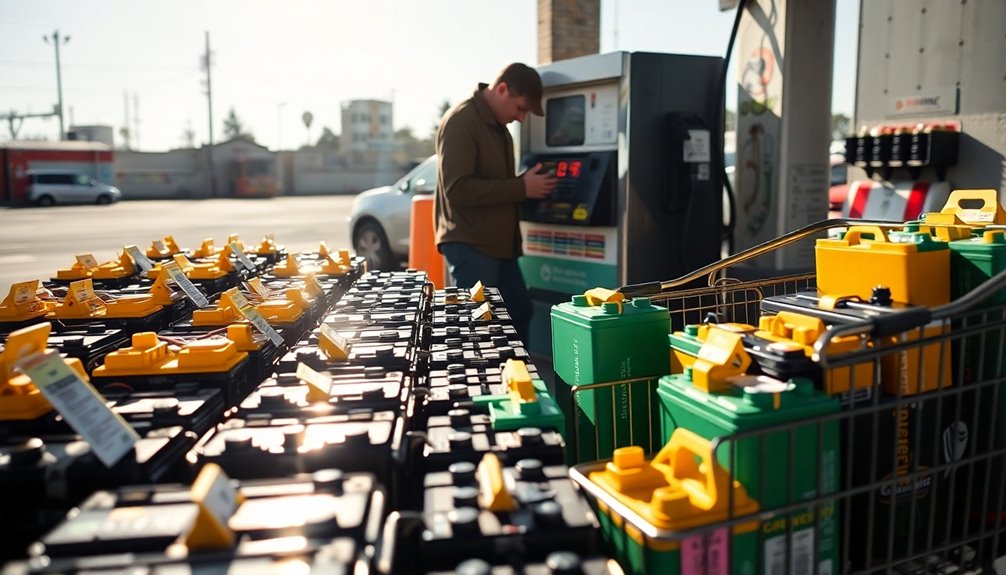
Batteries can vary widely in cost, especially when comparing gas stations to supermarkets.
When you look at the cost comparison of batteries, you'll notice that gas stations often charge more for AA and AAA batteries, with Circle K typically marking up prices considerably.
Specialty batteries like CR123 are even pricier and tend to be less available at gas stations.
If you're looking to save, consider bulk purchasing options online or from local dealers, as this can lead to better deals than buying individual batteries at a gas station.
While discounts and loyalty programs may occasionally help reduce costs, they vary by location.
Finding Batteries at Circle K
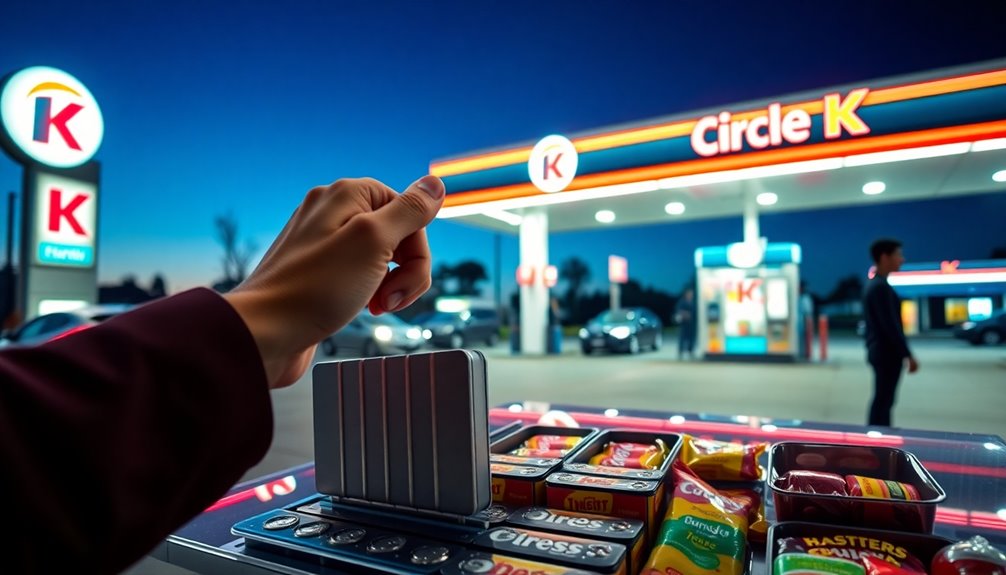
When you're in need of batteries, Circle K can be a convenient option, but availability can vary.
Many Circle K locations stock basic alkaline batteries like AA and AAA, though you can't always count on them being there. It's a good idea to ask the store staff about their battery stock, as some convenience stores have dedicated sections for these products.
While batteries mightn't be listed on their website, you can often find popular brands like Duracell and Energizer in-store.
To maximize your chances of success, research your specific battery needs and check online or through the app for in-store inventory before heading out.
Pricing is usually competitive, so keep an eye out for seasonal promotions!
Customer Experiences and Reviews

Many customers find gas stations to be a practical option for picking up batteries on the go, though experiences can vary widely.
While some praise the convenience of grabbing AA and AAA batteries during a fuel stop, others report stock issues and limited selection.
Keep in mind that battery availability can change considerably based on location and demand, so checking specific store inventories beforehand is wise.
Many appreciate the competitive pricing at gas stations compared to convenience stores, although some chains like Circle K might charge more.
Customers often recommend asking store staff for help in locating batteries, as not all gas stations have dedicated sections for these products.
Your experience may improve with a little preparation!
Alternatives to Gas Station Batteries
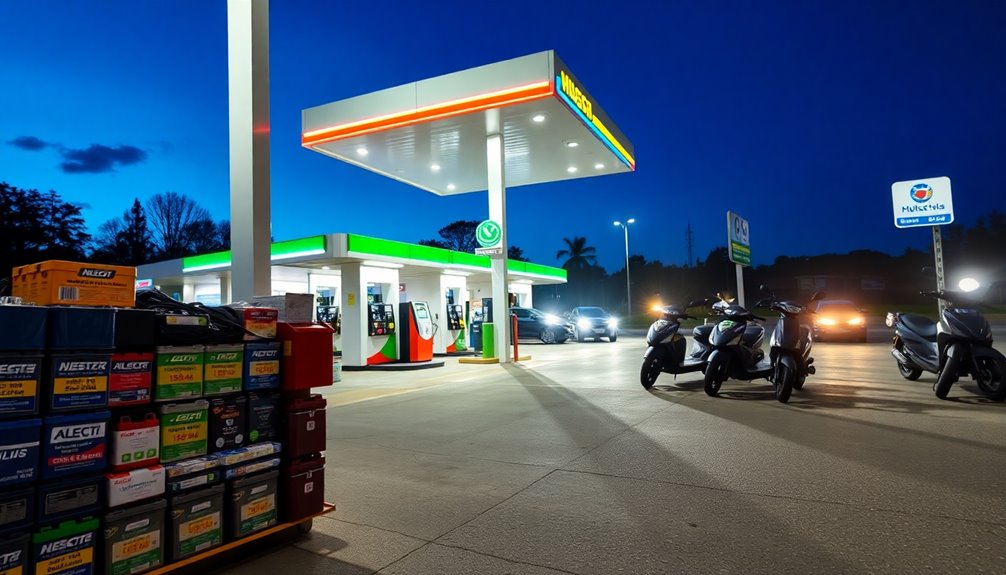
Have you considered where else you can find batteries besides gas stations?
You'd better explore supermarkets and specialized electronics stores, as they usually offer a wider selection and better prices. Online platforms are also a great option if you want to buy batteries in bulk, often at discounted rates.
Local convenience stores, like Circle K, might've some batteries, but stock can be limited, so check ahead. If you need specialty batteries, such as CR123 or rechargeable types, dedicated electronics or hardware stores are your best bet.
Finally, don't forget about community resources; sharing batteries with neighbors during emergencies can help you stay prepared and reduce your dependence on gas stations for battery purchases.
Best Practices for Battery Storage
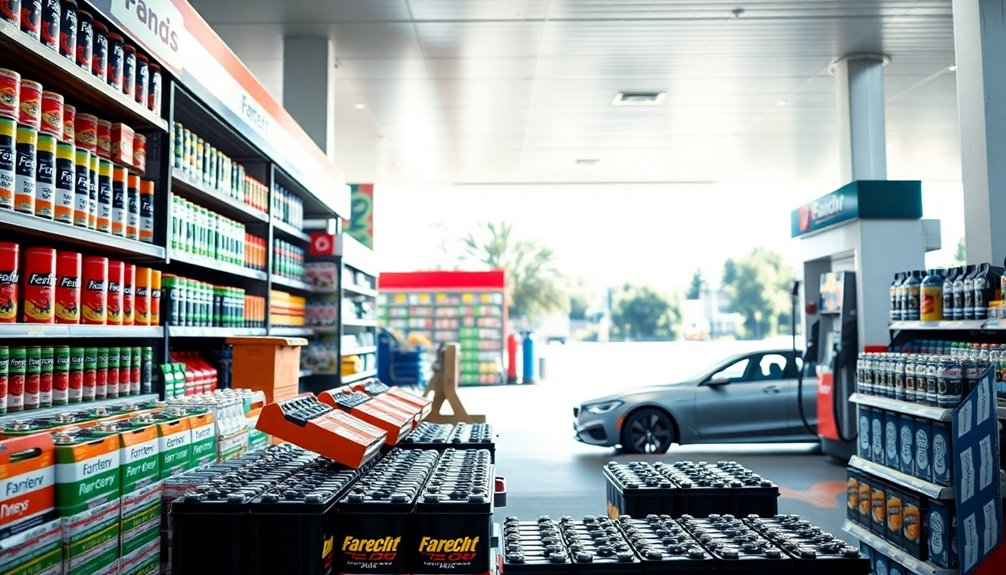
When it comes to storing batteries, you want to keep them in a cool, dry place to maintain their performance and longevity.
Be mindful of their shelf life and always use older batteries first to avoid any waste.
Following these best practices guarantees your batteries stay effective and ready when you need them.
Optimal Temperature Conditions
To guarantee your batteries perform at their best and last longer, store them in a cool, dry place where temperatures range from 68°F to 77°F.
These ideal temperature conditions are essential; extreme temperatures above 100°F or below 32°F can drastically reduce battery performance and lifespan, leading to leaks or damage.
For rechargeable batteries, keep them at about 40% charge for long-term storage.
Additionally, maintain humidity levels below 50% to prevent corrosion and preserve functionality.
By following these guidelines, you not only extend battery life but also enhance safety, minimizing risks associated with swelling or leaks from temperature extremes.
Proper storage guarantees your batteries remain reliable when you need them the most.
Shelf Life Considerations
Understanding shelf life considerations is essential for effective battery storage. To maximize shelf life, store batteries in a cool, dry place, ideally between 32°F and 77°F.
Keeping them in their original packaging helps protect against leakage and short-circuiting. It's smart to rotate your batteries, using older ones first to guarantee they don't expire, as shelf life can range from 3 to 10 years depending on the type.
Avoid high humidity areas like basements, which can damage battery life. Regularly check expiration dates and discard any batteries that are past their prime.
Frequently Asked Questions
Are Batteries Sold at Gas Stations?
Yes, gas stations do sell batteries, but the selection can vary.
You might find basic alkaline batteries like AA or AAA at many locations, especially popular chains. However, if you're looking for specialty batteries, your choices might be limited.
Prices are often higher than at supermarkets, so it's smart to compare before buying.
If you're unsure about availability, just ask the store staff for help or check for special promotions.
Where Can I Buy Batteries for a Good Price?
If you're looking to buy batteries for a good price, consider checking online retailers or supermarkets first.
They often have better deals and a wider variety.
Don't forget to look for seasonal promotions or loyalty programs that can save you money.
For bulk purchases or specific types, specialized electronics stores might be your best bet.
Always compare prices before making a decision to guarantee you're getting the best value for your money.
Where Is the Best Place to Store New Batteries?
To store new batteries properly, keep 'em in a cool, dry place, away from direct sunlight and moisture.
Aim for temperatures between 50°F and 80°F (10°C to 27°C) for ideal performance.
Use their original packaging or a designated container to prevent short-circuiting and stay organized.
Avoid extreme temperatures, like garages or attics, as they can affect reliability.
For rechargeable batteries, consider a charger with temperature control to enhance safety and longevity.
Do Gas Stations Have CR2032 Batteries?
You mightn't find CR2032 batteries at every gas station.
While they often stock common batteries like AA or AAA, the more specialized CR2032 isn't as frequently available.
It really depends on the location, as some gas stations might carry them due to local demand.
If you're in urgent need, ask the staff—they might know if they've any or suggest nearby stores where you can find what you need.
Conclusion
Next time you find yourself in need of a battery, don't overlook your local gas station—it might just save the day! Many popular chains stock a variety of batteries, making it convenient for emergencies. Whether you're on a road trip or just running errands, knowing where to look can make all the difference. So, why not keep an eye out for those batteries during your next pit stop? You never know when you might need one!

